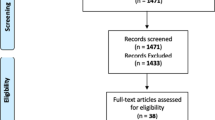Abstract
Severely mentally ill people with co-occurring substance abuse disorders are difficult to treat and the course of their psychiatric treatment is worsened by substance abuse. Despite increased attention to the problem, few studies of specialized treatment are reported in the literature and most lack detail about the specialized interventions employed. Qualitative data, gathered as part of a larger study of the cost-effectiveness of three substance abuse interventions for severely mentally ill people, are presented which describe the interventions, their implementation in four community mental health centers over 18 months of the study, and their relationship to the quantitative outcomes. Illustrated is the difficulty of implementing innovative programs and the need for vigilance concerning program fidelity.
Similar content being viewed by others
References
Bond, G., McGrew, J., and Fekete, D. (1994).Assertive outreach for frequent users of psychiatric hospitals: A meta-analysis. Indianapolis: Indiana University - Purdue University, unpublished.
Bond, G. (1989). Assertive community treatment of the severely mentally ill: Recent research findings. In K. Davis, R. Harris, J. Farmer, and F. Segal (eds.)Strengthening the Scientific Base of Social Work Education for Services to the Long-Term Seriously Mentally Ill. Richmond: Virginia Commonwealth University.
Bond, G., McDonel, E., Miller, L., and Pensec, M. (1991). Assertive community treatment and reference groups: An evaluation of their effectiveness for young adults with serious mental illness and substance abuse problems.Psychosocial Rehabilitation Journal, 15, 31–42.
Brekke, J. (1988). What do we really know about community support programs? Strategies for better monitoring.Hospital and Community Psychiatry, 39, 946–953.
Brekke, J and Test, M. (1992). A model for measuring the implementation of community support programs: Results from three sites.Community Mental Health Journal, 28, 227–247.
Drake, R., Antosca, L., Noordsy, D. (1991). New Hampshire's specialized services for the dually diagnosed. In K. Minkoff and R. Drake (eds.)Dual Diagnosis of Major Mental Illness and Substance Disorders. San Francisco: Jossey-Bass, Inc.
Drake, R., McHugo, G., and Noordsy, D. (1993). Treatment of alcoholism among schizophrenic outpatients: 4 year outcomes.American Journal of Psychiatry, 150, 328–329.
Emrick, C. (1987). Alcoholics Anonymous: Affiliation processes and effectiveness as treatment.Alcoholism: Clinical and Experimental Research, 11, 416–423.
Galanter, M., Castaneda, R., and Ferman, J. (1988). Substance abuse among general psychiatric patients: Place of presentation, diagnosis and treatment.American Journal of Drug and Alcohol Abuse, 14, 211–235.
Goldman, H., Ridgely, M.S., and Morrissey (1990). Form and function of mental health authorities at Robert Wood Johnson Foundation (RWJ) program sites: Preliminary observations.Hospital and Community Psychiatry, 41, 1222–1230.
Jerrell, J., Hu, T., and Ridgely, M.S. (1994). Cost-effectiveness of substance abuse treatments for the SMI.Journal of Mental Health Administration, 21, 281–295.
Jerrell, J., and Ridgely, M.S. (1995a). Improvements in functioning and symptomatology in people with dual diagnoses.Psychiatric Services, 46(3), 233–238.
Jerrell, J. and Ridgely, M.S. (1995b). Comparative effectiveness of three approaches to serving people with severe metal illness and substance abuse disorders,Journal of Nervous and Mental Disease, in press.
Liberman, R., Massel, H., Mosk, M., and Wong, S. (1985). Social skills training for chronic mental patients.Hospital and Community Psychiatry, 36, 396–403.
McGrew, J., Bond, G., Dietzen, L., and Salyers, M. (1994). Measuring the fidelity of implementation of a mental health program model.Journal of Consulting and Clinical Psychology, in press.
Minkoff, K. (1989). Development of an integrated model for treatment of dual diagnosis of psychosis and addiction.Hospital and Community Psychiatry, 40, 1031–1036.
Morse, G., Calsyn, R., Allen, G., Tempelhoff, B., and Smith, R. (1992). Experimental comparison of the effects of three treatment programs for homeless mentally ill people.Hospital and Community Psychiatry, 43, 1005–1010.
Orwin, R., Goldman, H., Sonnefeld, L., Gray Smith, N., Ridgely, M.S., Garrison-Mogren, R., O'Neill, E., Lucchese, J., Sherman, A., O'Connell, M.E. (1992).Community Demonstration Grant Projects for Alcohol and Drug Abuse Treatment of Homeless Individuals: Final Evaluation Report. DHHS Pub. No. NIH 93-3541. Rockville, MD: National Institute on Alcohol Abuse and Alcoholism.
Osher, F., and Kofoed, L. (1989). Treatment of patients with both psychiatric and psychoactive substance use disorders.Hospital and Community Psychiatry, 40, 1025–1030.
Ridgely, M.S., Osher, F., and Talbott, J. (1987)Chronic Mentally Ill Young Adults with Substance Abuse Problems: Treatment and Training Issues. Baltimore: University of Maryland Department of Psychiatry.
Ridgely, M.S. (1991). Creating integrated programs for severely mentally ill persons with substance disorders. In K. Minkoff and R. Drake (eds.)Dual Diagnosis of Major Mental Illness and Substance Disorder. San Francisco: Jossey Bass, Inc.
Rossi, P., Freeman, H. (1993).Evaluation: A Systematic Approach. Newbury Park: Sage.
Stein, L., and Test, M.A. (1980). Alternatives to mental hospital treatment: Conceptual model, treatment program, and clinical evaluation.Archives of General Psychiatry, 37, 392–297.
Test, M.A. (1991). The Training in Community Living Model: Delivering Treatment and Rehabilitation Through a CTT. In R. Liberman (ed.)Handbook of Psychiatric Rehabilitation. New York: Pergamon Press.
Author information
Authors and Affiliations
Additional information
This work was supported by a grant from the National Institute of Mental Health (R01-MH46331), Jeanette M. Jerrell, Principal Investigator.
Rights and permissions
About this article
Cite this article
Ridgely, M.S., Jerrell, J.M. Analysis of three interventions for substance abuse treatment of severely mentally ill people. Community Ment Health J 32, 561–572 (1996). https://doi.org/10.1007/BF02251066
Issue Date:
DOI: https://doi.org/10.1007/BF02251066



